 Petzlover
Petzlover African Serval is originated from South Africa but York Chocolate Cat is originated from United States. African Serval may weigh 10 kg / 23 pounds more than York Chocolate Cat. African Serval may live 5 years more than York Chocolate Cat. Both African Serval and York Chocolate Cat has same litter size. African Serval requires Low Maintenance. But York Chocolate Cat requires Moderate Maintenance
African Serval is originated from South Africa but York Chocolate Cat is originated from United States. African Serval may weigh 10 kg / 23 pounds more than York Chocolate Cat. African Serval may live 5 years more than York Chocolate Cat. Both African Serval and York Chocolate Cat has same litter size. African Serval requires Low Maintenance. But York Chocolate Cat requires Moderate Maintenance
 The African Serval is a wild cat that hails from Africa. You’ll see them on Africa’s savannas where there is tall grass and reeds, preferably near water.
The African Serval is a wild cat that hails from Africa. You’ll see them on Africa’s savannas where there is tall grass and reeds, preferably near water.
If you want to own a serval cat, you have to check whether you require licenses and permits as they are particularly difficult to rehome once you have owned one. Humans have kept them since ancient times, but they are not domesticated cats as such.
Breeding servals arrived in the United States many decades ago. Breeders have also crossed serval cats with domestic cats to produce hybrids, one of which is the Savannah cat.
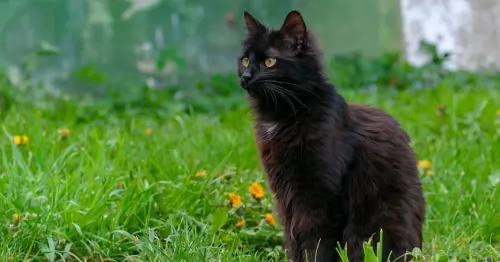 The York Chocolate cat is often referred to simply as the York. The cat was developed in New York in 1983 by breeder Janet Chiefari. The American breed of cat came about by selecting certain colors for breeding.
The York Chocolate cat is often referred to simply as the York. The cat was developed in New York in 1983 by breeder Janet Chiefari. The American breed of cat came about by selecting certain colors for breeding.
The breed isn’t recognized by cat registries, however, in March 1990, the Cat Fanciers’ Federation of the New England area recognized York Chocolates as an experimental cat breed.
By 2016 no registry carried its breed standard and it looks as though the cat is now extinct. Later is was also established that the International York Chocolate Federation was founded in 2003 but that the site seems to be archived.
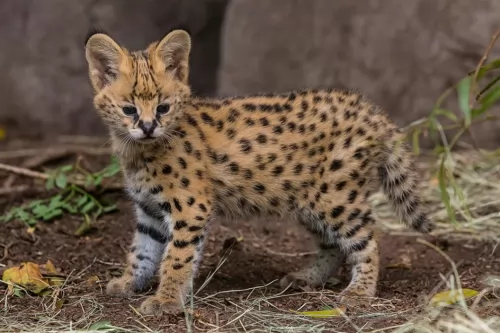 The Serval is a medium to large-sized cat that stands at between 54–62 cm in height and weighs in the region of 9–18 kg.
The Serval is a medium to large-sized cat that stands at between 54–62 cm in height and weighs in the region of 9–18 kg.
Some people think its a cat that looks similar to a Cheetah and this is because it also has a small head. It is known for its large ears which are black at the back with a large white dot. The attractively patterned coat is both spotted and striped with black against a golden/tawny shade.
These wild cats make a number of different noises - high pitched cries to growls, spitting sounds and purring. Another well-known feature with the cat is its particularly long legs. The tail has some black rings and it is black-tipped. The eyes of the Serval are a brown/greeny color.
The Serval cats will only come together for mating and then they resume their solitary lives. Gestation lasts for roughly 73 days after which up to 6 kittens can be born. In captivity, a Serval can live to be about 20 years of age.
The Serval is an active cat night and day. They are solitary animals not known for strong social interactions with humans but they can be playful with the few humans he gets to know.
People need to always know that owning a wild pet like this comes with risks. Not only that, a Serval wants to mark its territory and while you may provide a litter box, it's not to say he will use it.
They are able to bond with humans to some extent, more so if they were hand-fed from early on. They bond with one person and can form an affectionate relationship with that one person.
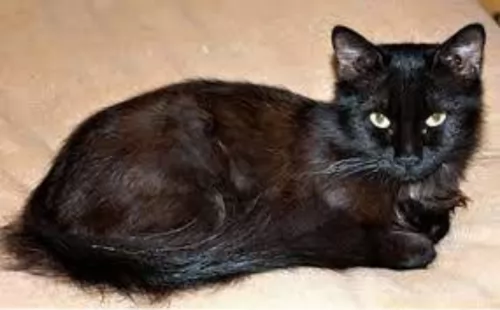 Today the breed is still under development and in the experimental stages. It is a medium to large cat, both robust, sturdy, and muscular.
Today the breed is still under development and in the experimental stages. It is a medium to large cat, both robust, sturdy, and muscular.
He can weigh up to 7 or 8 kg. The head is medium-sized with a rounded muzzle and the ears fairly large, pointed and tufted and broad at the base.
The eyes are medium in size, almond-shaped, and slanted slightly. The color of the eyes is a striking gold, green, or hazel.
The legs are also medium to long in length and well-muscled with the hind legs being a bit longer than the forelegs. The coat is medium to long, smooth and glossy with no undercoat. Color of the coat is mainly a rich chocolate color or silver, black and white.
The York Chocolate is a loyal and friendly cat. He is independent and although he loves his human family, he is perfectly happy on his own as well. They make wonderful pets as they get on well with children and also with other pets in the home.
They’re even-tempered and adapt well to all kinds of lifestyles. What is notable about this cat is that even if you tend to ignore him, he wants to lavish you with his attention. He is a cat that just loves to spend time with his human family.
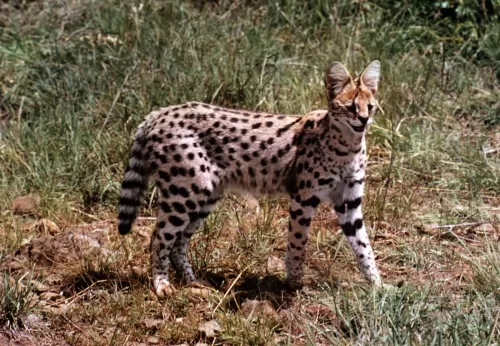 The African Serval is a wild animal and should be left in the wild.
The African Serval is a wild animal and should be left in the wild.
However, if you do decide to bring one into your home as a pet, they aren’t recommended for homes with young children or for a first-time pet owner.
Their play is rough and they like to use their teeth and claws during play. If the child gets hurt, then in typical unfair human fashion, the Serval is the one who suffers. They are capable of making good pets though but it is not recommended.
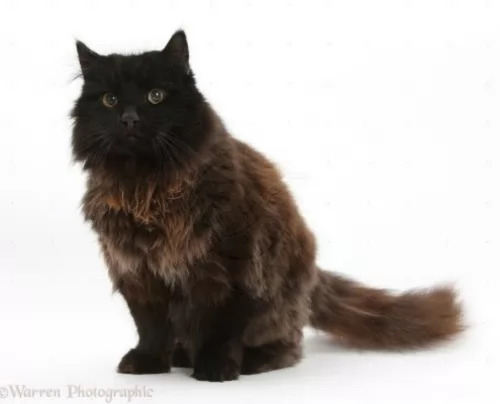 The York Chocolate is an ideal breed for families but he will get along well with single people too who are willing to make a fuss of him.
The York Chocolate is an ideal breed for families but he will get along well with single people too who are willing to make a fuss of him.
He is the kind of cat that makes himself at home indoors or outdoors. He has such an amicable nature and wants to be your friend. In return for this friendship, he needs to be given a whole lot of love and attention.
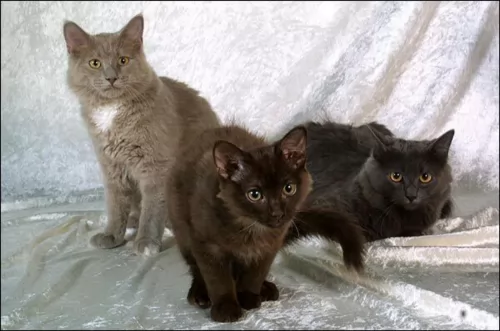 York Chocolates are generally considered to be healthy cats, but always schedule regular wellness visits with the vet if you suspect even the smallest illness.
York Chocolates are generally considered to be healthy cats, but always schedule regular wellness visits with the vet if you suspect even the smallest illness.
The insides of the cat’s ears should be examined regularly for signs of dirt and wax build-up that can lead to an infection.
The trend these days is to brush your cat’s teeth. This can absolutely traumatize your cat. When you take your cat for a check-up he will in any case look inside your cat’s mouth to make sure there aren't any bad teeth.
As a cat owner, it is a good idea to recognize the signs and symptoms of common illnesses in your cat. Cancer
Cats can get different kinds of cancer – where cells grow uncontrollably and spread to all parts of the body.
When a cat doesn't produce insulin, his blood sugar levels elevate and this can result in hyperglycemia.
Rabies is a viral disease that affects the brain and spinal cord. It's a deadly disease that can be prevented by vaccination.
Vomiting is a common problem with cats with many different causes. The danger with vomiting is that it can lead to dehydration,
A cat’s upper respiratory tract is susceptible to infections caused by a variety of viruses and bacteria.
 The Serval is a wild cat so in the wilds it eats prey such as frogs, birds and reptiles. They are known for leaping high into the air to catch prey but they will also burrow into holes to get prey out.
The Serval is a wild cat so in the wilds it eats prey such as frogs, birds and reptiles. They are known for leaping high into the air to catch prey but they will also burrow into holes to get prey out.
You should try to provide your Serval pet with some whole prey. Do research on the food of Servals because you will need to offer your wild pet a feline supplement. There are also formulated pelleted food, but this shouldn’t form the bulk of his food but rather be a supplement to his meats. Choose a variety of meats such as chicken, mice, turkey, beef, duck as well as rabbits and birds.
If you keep a serval, it is imperative that it has large outdoor areas to roam in. They’re nocturnal animals, so they become more active at night. They’re used to living near streams in the wild so some kind of pool will be required for him, possibly even a fish pond where he can catch his own fish.
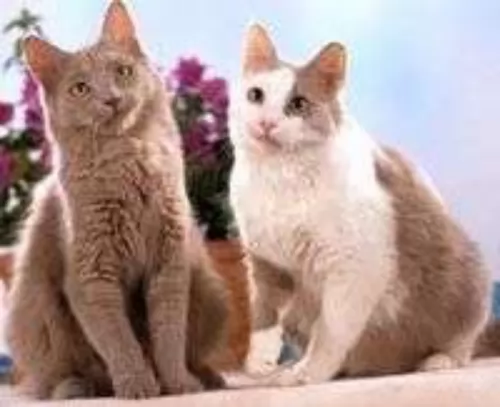 The coat of the York Chocolate is fairly short and it doesn't shed heavily. A weekly brush will suffice to help remove dirt and loose hairs as well as to maintain the coat’s sheen.
The coat of the York Chocolate is fairly short and it doesn't shed heavily. A weekly brush will suffice to help remove dirt and loose hairs as well as to maintain the coat’s sheen.
A high-quality diet high in protein and animal meat must be provided for your cat Cats are carnivores and are not plant eaters.